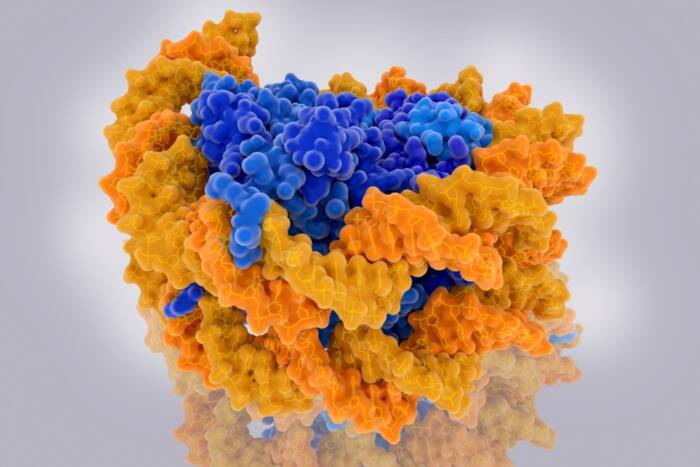Cech and Greenberg presented with honorary degrees
by TALLEY HENNING BROWN
 Generations of new scientists have been affected by the work of Thomas R. Cech and Maurice R. Greenberg. Dr. Cech, former president of the Howard Hughes Medical Institute and a dedicated teacher for over 30 years, has long been an advocate for the advancement of young scientists. Mr. Greenberg, chairman of The Starr Foundation and active in numerous other philanthropic initiatives, has made a second career of supporting the most innovative research. The recipients of this year’s honorary doctor of science degrees, Dr. Cech and Mr. Greenberg spoke at the June 11 afternoon Convocation ceremony.
Generations of new scientists have been affected by the work of Thomas R. Cech and Maurice R. Greenberg. Dr. Cech, former president of the Howard Hughes Medical Institute and a dedicated teacher for over 30 years, has long been an advocate for the advancement of young scientists. Mr. Greenberg, chairman of The Starr Foundation and active in numerous other philanthropic initiatives, has made a second career of supporting the most innovative research. The recipients of this year’s honorary doctor of science degrees, Dr. Cech and Mr. Greenberg spoke at the June 11 afternoon Convocation ceremony.
A graduate of the University of California, Berkeley, Dr. Cech joined the faculty of the University of Colorado, Boulder, in 1978. Four years later, he made a revolutionary discovery that would overturn long-held assumptions about ribonucleic acid. Demonstrating that a fragment of RNA from the single-celled pond organism Tetrahymena could cut and rejoin chemical bonds in the complete absence of proteins, Dr. Cech redefined RNA as more than just a passive carrier of genetic information, and proved that proteins are not the only catalysts. For this finding, Dr. Cech shared the 1989 Nobel Prize in Chemistry. He later went on to study the structure and function of telomeres, repetitive DNA sequences that protect the ends of chromosomes from natural degradation processes. In addition to the Nobel Prize, Dr. Cech is the recipient of a National Medal of Science and an Albert Lasker Basic Medical Research Award and a member of the National Academy of Sciences.
Dr. Cech currently serves as Distinguished Professor in the department of chemistry and biochemistry at CU Boulder, director of the Colorado Initiative in Molecular Biotechnology and an investigator at the Howard Hughes Medical Institute (HHMI). As president of HHMI from 2000 to 2009, Dr. Cech led one of the nation’s largest philanthropically funded organizations devoted to biomedical research. During his tenure, he expanded HHMI’s reach by opening its first freestanding research facility, introduced focused competitions to identify exceptional physician-scientists engaged in patient-oriented research, broadened the HHMI investigator competitions to embrace more interdisciplinary research and initiated the institute’s first ever Early Career Scientist competition.
Referencing Abraham Flexner, brother of Rockefeller’s first president and a staunch advocate of progressive educational ideologies, Dr. Cech extolled for the graduates the virtues of including teaching in their career plans. Not only will they make an important contribution to the development of generations of scientists to come, Dr. Cech explained, but teaching will also add a unique source of gratification to their personal lives and will benefit their research. “I have one word of advice for the new Ph.Ds., and that is: Teach,” said Dr. Cech.
At the age of 17, Maurice Greenberg hid his real age and joined the American Army in its World War II campaign, serving in Normandy, France, and participating in the liberation of the concentration camp at Dachau, Germany. Mr. Greenberg also served in the Korean conflict, achieved the rank of captain and received a Bronze Star. In between military tours, he earned a law degree from New York Law School and was admitted to the New York Bar in 1953. Mr. Greenberg joined C.V. Starr & Company as vice president in 1960. He was elected director in 1965, president and CEO in 1968 and chairman and CEO in 2005. In 1962, he took over presidency of the American holdings of American International Group, becoming president and CEO of the company in 1967 and chairman and CEO in 1989. Under his leadership, AIG became the largest insurance company in the world. Mr. Greenberg retired from AIG in 2005.
Mr. Greenberg was elected to The Rockefeller University Board of Trustees in 1997. He is chairman emeritus of NewYork-Presbyterian Hospital and the NewYork-Presbyterian Hospital Foundation. He is a member of the board of overseers of Weill Cornell Medical College and chairman of the Academic Medicine Development Company. Mr. Greenberg has served on the boards of New York University, the American Museum of Natural History and the Asia Society, where he was chairman. He is honorary vice chairman and director of the Council on Foreign Relations and an honorary trustee of The Museum of Modern Art and is active in a number of other civic and charitable organizations. As chairman of The Starr Foundation, he oversees the disbursement of significant financial support to academic, medical, cultural and public policy institutions.
Mr. Greenberg has long been a champion of inter-institutional collaboration. In 2000, he launched the Tri-Institutional Center for the Study of Hepatitis C. As head of The Starr Foundation, in 2005 he provided $50 million for the creation of the Tri-Institutional Stem Cell Initiative, in response to the federal funding restrictions placed by George W. Bush’s presidential administration on embryonic stem cell research. Speaking before the graduates June 11, Mr. Greenberg said, “The easiest thing to do is be successful in business; the hardest thing to do, I think, is to be a great researcher, and I take my hat off … in honoring their work and their contributions.”


